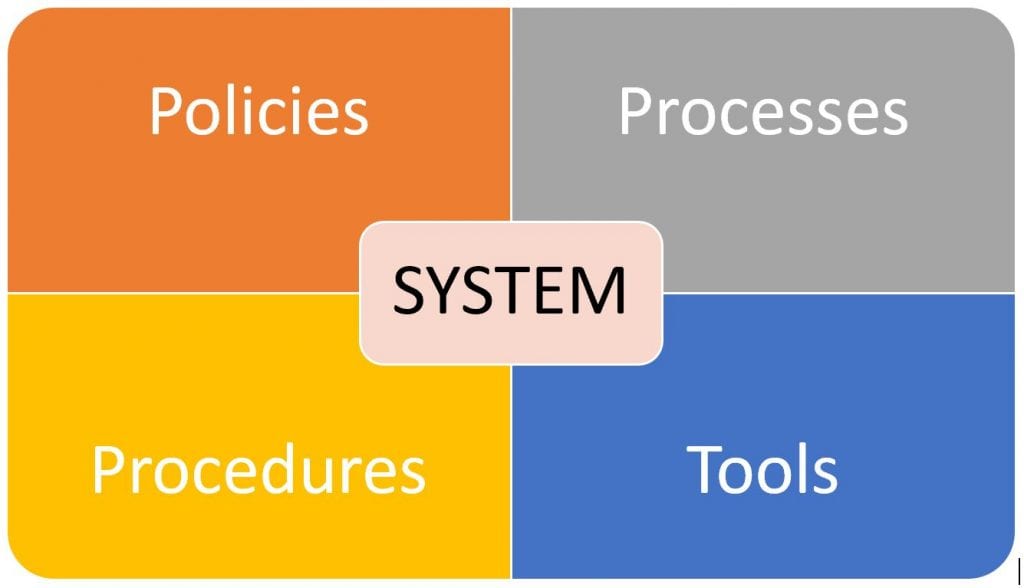 As an accounting firm coach and consultant who gets to see under the bonnet of a lot of accounting firms, I remain convinced that the profession has an endemic undervaluing of systemised, standardised and documented ways of getting things done, which are consistently applied across a firm.
As an accounting firm coach and consultant who gets to see under the bonnet of a lot of accounting firms, I remain convinced that the profession has an endemic undervaluing of systemised, standardised and documented ways of getting things done, which are consistently applied across a firm.
Before we get to the 10 reasons here is my definition of some terms that are relevant and can have different meanings for different people.
System
The combination of tools and processes to carry out a specific activity, perform a duty or solve a problem – a predetermined way to consistently achieve a result. May be guided by policies.
Policy
Principle/s, or framework/s to guide behaviour, establish boundaries and clarify expectations in respect of a particular matter. The why.
Process
A high level description / map / overview of the activity or tasks to be completed. The what.
Procedure
Step by step instructions for completing a task or series of tasks that make up a process. The detailed how.
So a procedure is a subset of a process which is a subset of a system.
Tools
The software applications, templates, checklists and other guidance material that support efficiency and effectiveness of task completion.
Graphically it looks like this:

10 reasons for having systemised, standardised and documented ways of getting things done:
- A team member does not waste time trying to figure out how to do something and new team members can be brought up to speed quicker
“Let’s not reinvent the wheel” is a much used saying and yet reinventing the wheel is exactly what I see inside firms. Without proper guidance each person figures out their way of doing something. Not only does that waste time to figure it out, the chances are it’s not the best way. Many firms say it takes three to six months for a new recruit to get up to speed and be profitable. If you significantly reduce that time the benefits are obvious. - There is consistency across the firm in how things are done and thus predictability in relation to outcomes and quality – you are less likely to make mistakes
You can trust that you will get the “right” outcomes because the system ensures that. - The way things are done is based on “best practice” – both efficiency and quality
This is dependent on you adopting a continuous improvement mentality as I discuss in my article on lean thinking. [Hyperlink to article] Best practice doesn’t stand still and nor should you! - Tasks can be completed at a lower level of team member than would otherwise be possible and thus the cost of delivery is lower
My rule of thumb is that senior accountants, managers and directors in firms spend 50% of their time on tasks that could be done be a less expensive resource. Having great systems makes delegating so much easier. - Where there are multiple teams it is easy to move between teams
When doing firm reviews a common thing I hear is that there are different ways of doing things between teams. Each director has his or her own fiefdom where it is “my way or the highway”. That means it is really hard to load balance between teams. Frankly I think this is dumb. Inevitably there are some workload peaks and troughs across teams and it is crazy not to be able to seamlessly move people as needed between teams. - It supports your ability to scale – typically the larger you get the more you need the systems
I’ve worked in a 20 person firm, a 30 person firm, a 120 person firm, a 180 person firm and a 1,000 person firm. Systems are super powerful regardless of size but as you scale you are going to get chaos if you don’t have them. - It reduces your reliance on any one person
More than once I have visited a firm who has said something like “Sally is away today and she is the only person who knows how to do that so it will have to wait”. This is madness! We cannot have anything in our firms that is dependent on just one person. Having systemised, standardised, documented way for doing things stops this. - It underpins a consistently great client experience
I am absolutely convinced that the client experience benefits enormously from great systems. Yes a great client experience is going to be underpinned by relationships but those relationships are made so much easier by the systems. To quote Ken Blanchard in his great book Raving Fans – At the core of every great customer service organisation is a package of systems and a training program to inculcate those systems into the soul of that company. That’s what guarantees consistency…….Systems are what allows you to guarantee delivery – not smiles and “Have a Nice Day” - Ultimately, you can achieve more with less
In other words your margins will be better and your profitability higher. All the other reasons I’ve just identified combine to deliver better results for you. - It can add value if you want to sell your firm
You may not be planning on selling out any time soon but even so it is worth remembering that having great systems can contribute to you getting a higher sale price.
If you want help to unlock all the benefits of having systemised, standardised, documented work practices I’ll be pleased to work with you to make it happen. [email protected]
